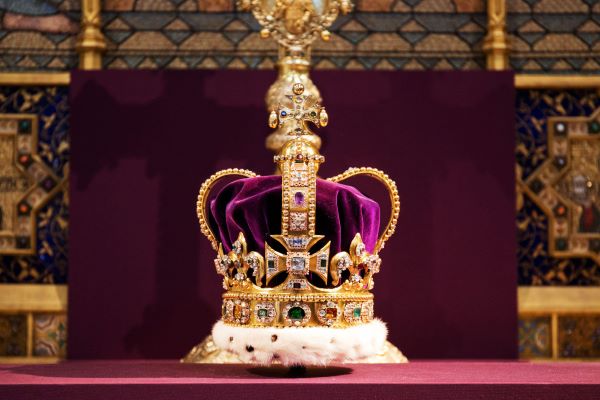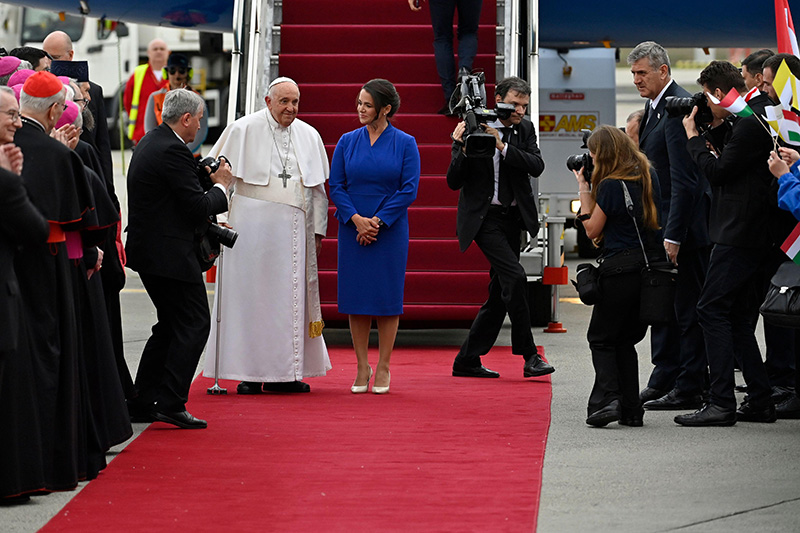Pope Francis warned of the risk of technological domination and the threat it poses to culture and to our human ecology.
He also spoke about the false freedoms offered by both communism and consumerism, and encouraged people to seek out Christ’s truth.
On 30 April the Pope addressed approximately 250 people, including 30 students, from the Faculty of Information Technology and Bionics at the Pázmány Péter Catholic University in Budapest.
The visit was the final meeting in Francis’ three-day trip to Hungary’s capital.
In his speech, Pope Francis made extensive reference to the 20th-century intellectual, Romano Guardini, a Catholic priest, theologian, and philosopher, and the author of the book Letters from Lake Como: Explorations in Technology and the Human Race.
“Guardini did not demonise technology, which improves life and communication and brings many advantages, but he warned of the risk that it might end up controlling, if not dominating, our lives,” Pope Francis said.
The priest, he added, “foresaw a great threat: ‘[in that case] we lose all the inner contact that we might have derived from a sense of proportion and the following of natural forms. We become inwardly devoid of form, proportion, and direction. We arbitrarily fix our goals and force the mastered powers of nature to bring them to fulfilment.’”
Guardini, said Francis, “left posterity with a troubling question – ‘What will become of life if it is delivered up to the power of this dominion?’”
“A system of machines is engulfing life … Can life retain its living character in this system?” Guardini asked in one of the letters in his book.
“Can life retain its ‘living’ character?” the Pope repeated. “This is a question that is proper to ask, particularly in this place, which is a center of research into information technology and the bionic sciences.”
Pázmány Péter Catholic University is a private Catholic university founded in the 17th century. It is one of Hungary’s oldest educational institutions.
The Faculty of Information Technology and Bionics “is unique in Hungarian higher education” for training IT engineers in the human sciences, especially genetics, the nervous system, and the immune system, according to the university’s website.
At the university, Pope Francis also warned of the “false notion of freedom” offered by the ideologies of communism and consumerism.
He quoted Jesus’ words that “the truth will make you free” and said “communism offered a ‘freedom’ that was restricted, limited from without, determined by someone else”.
“Consumerism,” instead, he added, “promises a hedonistic, conformist, libertine ‘freedom’ that enslaves people to consumption and to material objects.”
The way forward, Pope Francis said, is truth: “The key to accessing this truth is a form of knowledge that is never detached from love, a knowledge that is relational, humble and open, concrete and communal, courageous and constructive. That is what universities are called to cultivate and faith is called to nurture.”
Francis also pointed out the increasing isolation of people immersed in social media, while being less and less “social,” and who “often resort, as if in a vicious circle, to the consolations of technology to fill their interior emptiness”.
“Living at a frenzied pace, prey to a ruthless capitalism, they become painfully conscious of their vulnerability in a society where outward speed goes hand in hand with inward fragility,” he said.
The Pope added that he did not want to encourage pessimism but to reflect on the “hubris of pride and power denounced at the dawn of European culture by the poet Homer, which the technocratic paradigm exacerbates, and threatens, through a certain use of algorithms, to further destabilise our human ecology”.
Francis also addressed the importance of culture, which he described as “the ‘cultivation’ of our humanity and its foundational relationships, with the transcendent, with society, with history, and with creation”.
He said the 1907 novel The Lord of the World by Robert Hugh Benson, “was to some degree prophetic in its description of a future dominated by technology, where everything is made bland and uniform in the name of progress, and a new ‘humanitarianism’ is proclaimed, canceling diversity, suppressing the distinctiveness of peoples and abolishing religion.”
“Opposed ideologies merge and an ideological colonisation prevails, as humanity, in a world run by machines, is gradually diminished and social bonds are weakened,” he said.
“In the technically advanced yet grim world described by Benson, with its increasingly listless and passive populace, it appears obvious that the sick should be ignored, euthanasia practiced and languages and cultures abolished, in order to achieve a universal peace that is nothing else than an oppression based on the imposition of a consensus.”
The Pope said one of the messages he wanted to leave the university students and faculty with was the famous maxim “know thyself”.
“What do those words mean: know thyself? They counsel us to be able to recognise our limitations and, consequently, to curb the presumption of self-sufficiency,” he said.
“Technocratic thinking pursues a progress that admits no limits, yet flesh and blood human beings are fragile, and it is precisely by experiencing this, that they come to realise their dependence on God and their connectedness to others and to creation.”
Pope Francis’ visit to Budapest included meetings with President Katalin Novák and Prime Minister Viktor Orbán. He also spent time with visually impaired children, young adults, and clergy.
On the morning of April 30, he celebrated Mass for 50,000 people gathered in and around Kossuth Lajos Square.
Later, Pope Francis said on board the papal plane on Sunday that he did not lose consciousness before his hospitalisation at the end of March, which was for “strong and acute pneumonia” in his lower lungs.
“What I had was a severe illness at the end of the Wednesday audience,” he said on 30 April, during his return flight from a three-day trip to Budapest, Hungary.
Asked about the state of his health, the 86-year-old Pope said he had felt bad on 29 March and went to lie down instead of eating lunch.
“I didn’t lose consciousness,” he explained, noting that he developed a high fever and at 3pm, his doctor took him to the hospital for “acute and strong pneumonia, the lower part of the lungs”.
Pope Francis spent three nights in Rome’s Gemelli Hospital from 29 March to 1 April.
A statement from the Holy See Press Office said the Pope had been diagnosed with bronchitis, and that his condition improved after receiving antibiotic infusion therapy.
“The body responded well to the treatment. Thank God,” Francis said Sunday.
Bronchitis and pneumonia are both infections of the lungs. Bronchitis is an infection in the bronchial tubes, while pneumonia is an infection in the alveoli, or air sacs of the lungs.
Pope Francis was asked about his health in the context of his planned upcoming travels, in particular to Lisbon, Portugal at the beginning of August for World Youth Day.
The pope said a doctor checked him out the day before his trip to Budapest to make sure all was well for him to travel.
The trip to Lisbon is on “for the time being,” he added. “And then there is the trip to Marseilles, [France], then there is the trip to Mongolia.”
The question came at the end of a trip that saw the Pope follow a much more relaxed schedule than previous travels he has undertaken, with only two public speeches per day.
The Pope used both a wheelchair and a cane to move around.
During the in-flight press conference, a journalist asked Pope Francis if he thinks the Vatican will be able to help Ukraine retrieve children taken to Russia, as he was asked to do during a recent meeting with Ukraine’s prime minister.
“I think so, because the Holy See brokered some of the prisoner exchange situations through embassies,” he said.
“I think it can go well, that is also important. At least the Holy See is willing to do that because it’s right, it’s a just thing and we have to help…”
“We have to help,” he added, so that it does not become “a casus belli”.
The Pope was asked about his meeting with Orbán and the closure of the Balkan migrant route at Hungary’s border, and whether his meeting with Russian Orthodox Metropolitan Archbishop Hilarion in Budapest on 29 April could open up a path to peace talks with Vladimir Putin.
“I believe that peace is always made by opening channels. Never can peace be made by closure,” he said.
The Pope said ecumenism is about maintaining relationships. “We have an outstretched hand with everyone, even receiving the hand of God.”
He added that while he has only spoken with Patriarch Kirill of Moscow once, he is “in connection” with him through an Italian bishop who knows the Russian environment well and who comes to brief him on it.
“The relationship with the Russians is mainly with this ambassador [of Russia to the Holy See],” he said, with whom there is a good relationship.
“Everyone is interested in the road to peace,” he continued. “I am willing to do whatever needs to be done. Even now there is a mission going on, but it is not public yet.”
On migration, Pope Francis said Europe needs to tackle the issue, because “there are five countries that suffer the most: Cyprus, Greece, Malta, Italy, Spain”.
“Europe is not taking charge of that, of a fair distribution of migrants,” he said.
Another problem in Europe, he said, is the low birthrates in some of the same countries with a high influx of immigrants, like Italy and Spain. These countries are also seeing many of their young professionals leave for other countries, he pointed out.
Referencing Pope Francis’ gift last year of three fragments of Parthenon sculptures from the Vatican Museums to the Greek Orthodox archbishop of Athens, a journalist asked if he was considering returning to indigenous groups in Canada artifacts taken during colonization.
Francis called to mind the seventh commandment and its directive to not steal, before calling his decision to give back the Parthenon sculptures “a correct gesture”.
“But there has to be discernment either way,” he added.
He said the Vatican has agreed to return indigenous objects to Canada and that he believes the process is underway.
He also encouraged returning stolen objects. “This is good for everyone. It’s so that you don't get used to putting your hand in other people’s pockets,” he said.



 Loading ...
Loading ...